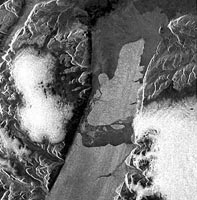 Last Saturday we posted about a one hundred square mile ice island that broke off from the Petermann glacier in Greenland. Experts from the Canadian government, with the aid of NASA , the European Space agency and numerous other academic institutions, are planning how to deal with the massive ice island as it breaks up while drifts to the south over the next two years, potentially threatening oil platforms and shipping.
Last Saturday we posted about a one hundred square mile ice island that broke off from the Petermann glacier in Greenland. Experts from the Canadian government, with the aid of NASA , the European Space agency and numerous other academic institutions, are planning how to deal with the massive ice island as it breaks up while drifts to the south over the next two years, potentially threatening oil platforms and shipping.
Giant iceberg drifting toward Canada could threaten ships, oil platforms
Environment Canada’s Trudy Wohlleben, the Canadian Ice Service forecaster who first spotted last Thursday’s birth of Petermann Ice Island 2010, said Tuesday that federal scientists plan to parachute beacons onto the 250-square-kilometre monolith next month to help track its movements along Ellesmere and Baffin islands and, eventually, down the coasts of Labrador and Newfoundland.
Icebergs calved from Greenland’s glaciers and floating ice shelves typically follow that Canadian route south, as did the huge one that struck and sank the Titanic in 1912.
Wohlleben said the Canadian Ice Service does have “a precedent” to help shape its response to the latest threat — a 29-square-kilometre iceberg that broke away from the Petermann Glacier in 2008 and required constant monitoring until the end of last summer.
“But this one is about 10 times larger,” she told Postmedia News on Tuesday. “It’s something we’ll be watching closely.”
The ESA released satellite images of the ice island on Monday and the agency’s Italy-based spokesman Robert Meisner said Tuesday that Canadian officials will have “regular and full access to Envisat Radar data for sea ice charting activity.”
Wohlleben said the colossal initial size of the ice island — currently about 28 kilometres long and nine kilometres wide — means that as it gradually breaks apart while drifting south into warmer waters, the resulting fragments will be considerably bigger and heavier than normal icebergs.
